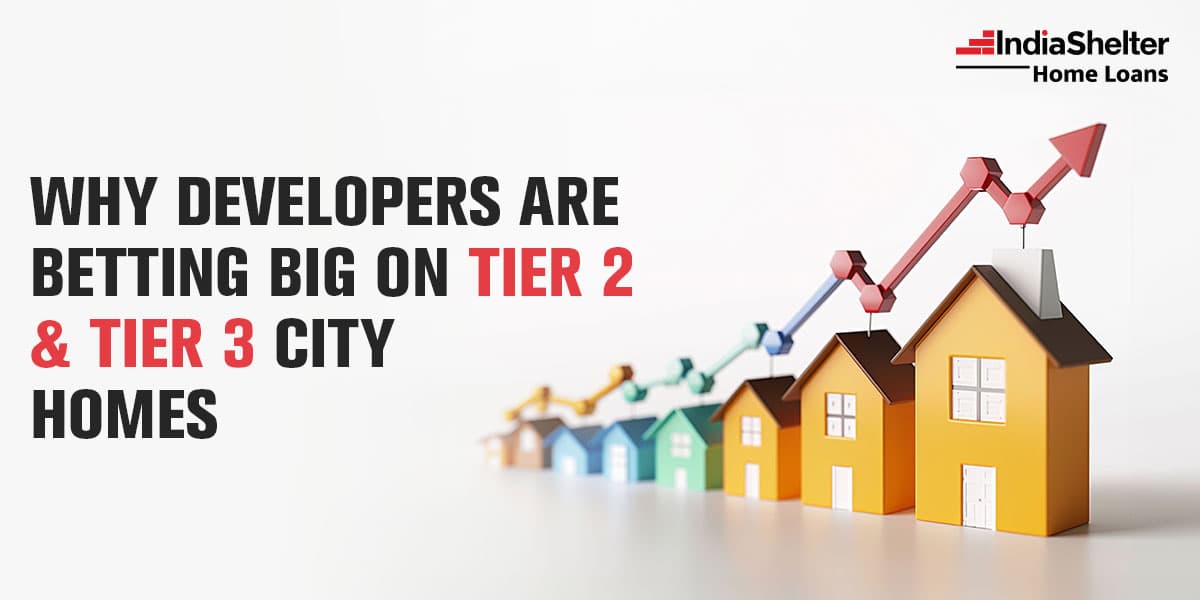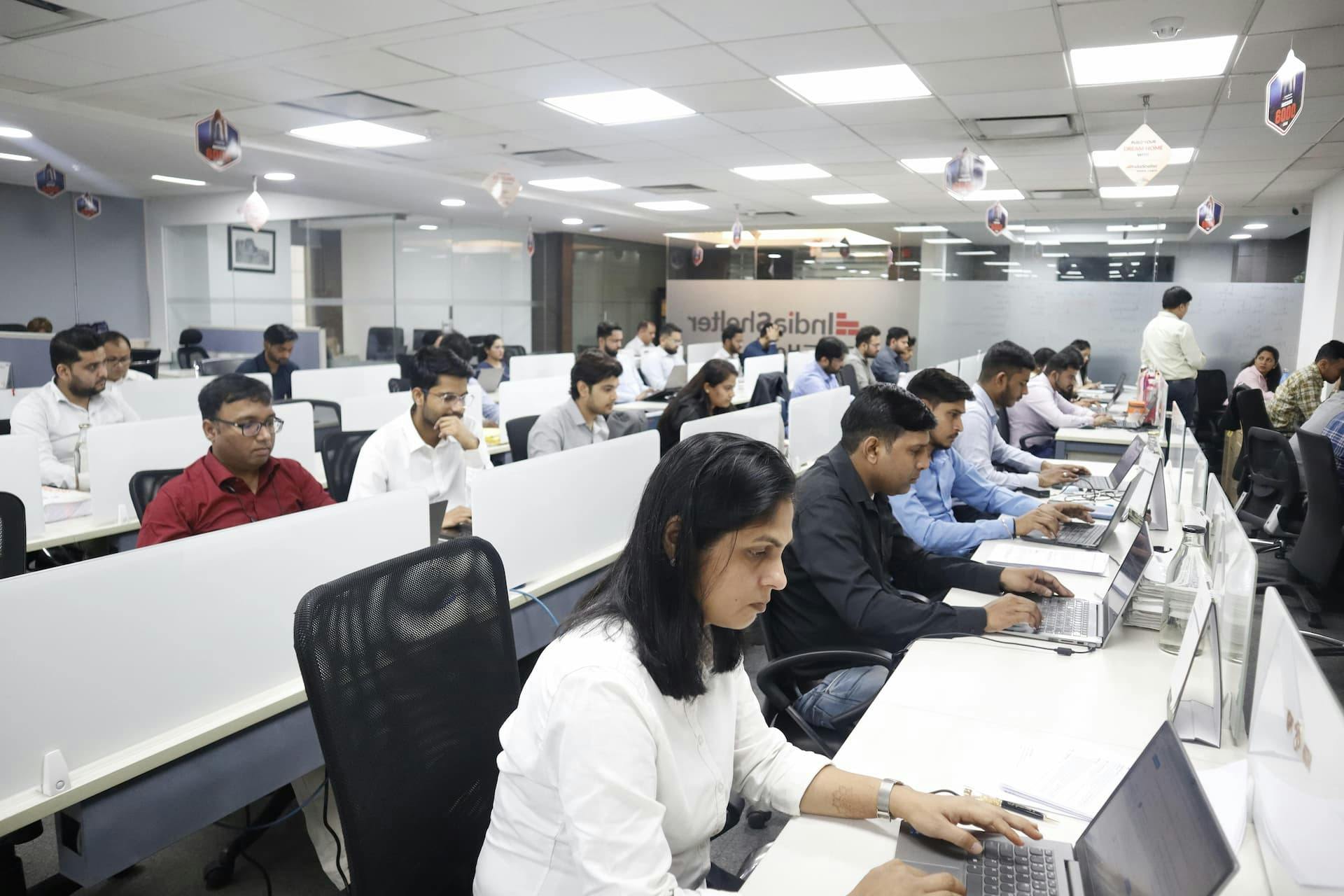Why Developers are Betting Big on Tier 2 & Tier 3 City Homes

Published on :2024-11-06
Introduction
The realty market of India is booming, particularly in Tier 2 and Tier 3 cities. Why? Reason: these smaller cities are getting major facelifts. The major upgrades like new roads, better railways, and rapid transit systems are making those areas accessible and more appealing. The rising prices in the big cities are one of the major reasons which is pushing people to look for affordable alternatives. Quick to ride this change, real estate developers are trying to woo them by turning these once-neglected towns into the next big thing in housing.
Demand for homes on the rise in Tier 2 & Tier 3 cities
Tier-I cities, more commonly called metropolitan cities or metros, have for quite a long time been a magnetic reporter of settlers. Metros are the places to which people have invariably migrated for better job opportunities and more egalitarian societies. Suddenly, with the growth of remote work fueled by lockdowns, metros are witnessing a slow but steady exodus of people to tier-II cities. Why? Let's see.
1. Lower cost of living
It would be noticed that the cost of living, on an average, in tier-II cities is relatively lower than in metros. This happens because real estate and labour are inexpensive, which has a downward pull effect on the prices of other products and services. Tier-II cities are by and large less expensive on rent, healthcare and education expenses for children.
2. Lower cost housing
Land, buildings, apartments, and commercial spaces are more affordable in tier-II cities. As such, individuals and families looking to buy a home might find far more attractive and spacious options within their budget in tier-II cities. From the perspective of a home loan, buying a house in a tier-II city makes more sense: cheaper real estate means a smaller loan, reducing the interest burden on the borrower and his repayment liability. India Shelter Home loans come with attractive interest rates. This makes them provide affordable home loans to people with minimum paperwork.
3. Proximity to family
Many metro settlers still have a family, including parents, living in tier-II cities. With many physical workplaces being rendered useless, thanks to remote work options, people are moving back to their hometown, closer to families and parents.
4. Better quality of life
Air is cleaner, more open spaces abound, and the great outdoors is easily accessible in Tier-II cities compared to the metros. They are less crowded. For many, these factors turn out to be a better quality of life for themselves and their families. As housing picks up in tier-II cities, which itself represents a value proposition that becomes hard to ignore.
Advantages of Developing in Tier 2 & Tier 3 Cities
As urbanization increases, big-city pressure mounts. And as our largest cities grow in population, the bleakness of life can sometimes feel overwhelming. Who doesn't feel that tiring daily struggle of getting through congested streets, ever-soaring house costs, and staying always on edge in the relentless energy of a metropolis? In such a scenario, it's little wonder many are returning for a more balanced way of life.
It is here that Tier 2 and Tier 3 cities come into the picture and present a very exciting opportunity for both residents and developers. The economic realities are undoubtedly very appealing—land and construction costs that are establishing much lower, which can unleash an enormous amount of potential for building beautiful homes and modern spaces. There is a discovery element in this—making an exchange where one could find the hidden gem that holds an immense promise.
One varied trend, which remains interesting, is the phenomenon wherein people now look to get out of bustling metropolitan cities and move into places that promise a more sedate pace of life. Tier 2 and Tier 3 cities are well positioned for that. It presents a very different kind of opportunity where developers can service this need for good housing and commercial spaces.
Governments, realizing the potential of such new burgeoning centers, actively extend a helping hand to developers. That means tax breaks and streamlined regulations that welcome—sort of like a high five—those who have_usr brought their talents and vision to these exciting new frontiers. It's a metamorphosis time for the cities themselves, with investments in infrastructure like better roads, reliable utilities, and appealing green spaces that transform their appeal. Additionally, the growth of educational institutions and training centers has been fostering an increasing supply of skilled local talent. This makes it easier for the developer to search for adequate manpower and injects pride in the local community.
Customisation of Luxury Lifestyle for Tier 2 & Tier 3 Residents
Imagine this: weary from the restless city that never sleeps, but the noise keeps one awake long enough longing for tranquility. Say goodbye to compact apartments and endless traffic jams. Tier 2 and Tier 3 cities create a haven for those who desperately want to have a life balanced in living, working, and playing right.
Developers are really embracing this change and redefining luxury living for a new age. Today's homes are emotive of local culture and blend seamlessly with the environment to create a sense of belonging. Lush green spaces evoke a feeling of personal retreat, and smart technology enhances everyday life.
However, the real magic in building bridges is way more than that. Gated communities feel like neighborhoods-complete with lavish amenities and social functions that knit the residents together. This trend is one that answers a further-reaching call: for community, and luxury living, with a bonafide community-warm feel.
Challenges and Considerations
The big city's got you feeling a little. squished? In need of some fresh air, a slowed-down pace? Think Tier 2 and Tier 3 cities—the whole vibe is like a hidden gem. Here is what every developer looking to build something special needs to know.
Understand Your Neighbors: It is not one of those cookie-cutter deals. They have different dreams here than they do in the city. You need to talk with the people to understand what counts. Do something that'll fascinate them, not just another development project.
Get Around the Maze: Local regulations can be tricky. Partner with local experts to avoid getting red-taped or delayed.
Assemble Your Dream Team: The right people might be tough to find. The talent pool's going to be significantly smaller; therefore you are probably going to have to either train locals or import people from out of town. It'll just take some more planning.
Gain Trust: Banks are a bit more gun-shy about investing in smaller towns. Give them a good plan, convince them of the potential, and gain trust with the local lenders.
Knowing Your Market: Every city has its economic rhythm. Be aware of how things function here, job markets, income levels, the future prospects, price things fairly, and ensure your project fits with local lifestyles. While tier 2 and 3 cities come with really exciting opportunities, it's with extra bits of planning and some local insights that you can get something really exceptional.
Financing the Dream: Home Loan Options Available for Tier 2 & Tier 3 Homebuyers.
A home is the dream of many. But most of the time, schemes for loans sound baffling. Don't worry; let us explain it in a simple and lucid way.
Loan Options available for homebuyers in Tier 2 & Tier 3 cities:
- Fixed-rate: Same monthly installments
- Adjustable-rate: Installment may vary with market conditions
- Construction loans: In case of building your own home
- Home improvement loans: For renovation
Steps to Getting Started:
- Check if you are eligible: Based on income, credit score, and job stability
- Compare lenders: Shop for the best terms
- Get all of the documents ready and get pre-approved
- Tips for Tier 2 and 3 City Buyers:
- Build a sound credit score
- Save for a down payment
- Invest time in comparing offers
- Understand all terms before signing
Conclusion
There seems to be a big boom in housing happening across the smaller Indian cities! This indeed is changing the very game of real estate in the country. Builders are excited about these Tier 2 and Tier 3 cities because the land is cheaper, there are more and more people who want to buy homes there, and the government is even giving them the nudge by offering special deals. It is in these cities that the sweet spot lies—affordable housing, a nice life, and new jobs—making them perfect for both building and buying homes. While roads, transportation, and more skilled workers get built in these smaller cities, they're turning into exciting hubs. Tier 2 and Tier 3 cities fall as the perfect spot to give them all that.
Related Blogs

2025-12-11
Common Mistakes to Avoid When Applying for a Home Loan in 2026
Planning to take a home loan in 2026? Don’t apply before reading this- learn about the top mistakes many borrowers make and how you can avoid them for smoother approval and lower long-term costs.

2025-07-30
How Green Homes Can Cut Your Electricity Bills by Up to 40%
Discover how simple eco-friendly changes in your home can reduce electricity bills by up to 40% and lower your carbon footprint. Start your green journey today!

2025-07-30
How Much Home Loan Can I Get with a ₹25,000 Monthly Salary?
Wondering how much home loan you can get on a ₹25,000 monthly salary? Find out your eligibility, loan amount, and smart tips to improve approval chances.
Disclaimer: *By contacting IndiaShelter on Toll Free/WhatsApp/Website or any other mode, you authorize our representatives to reach out to you through personal communication via SMS, WhatsApp and phone calls regarding our services. This consent will supersede any registration for any Do Not Call (DNC) / National Do Not Call (NDNC).
© India Shelter Finance Corporation 2024 | All rights reserved
Design with byCyberworx





